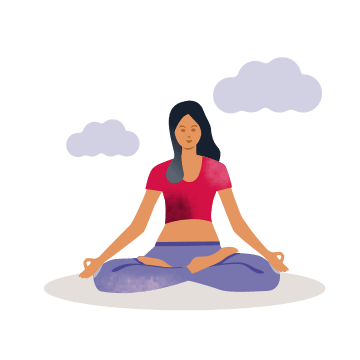It’s been a long day and you feel exhausted. So, you climb into bed, tuck yourself in, ready for some shut eye. But in a split second, everything changes. You begin to feel anxious with a million things running through your mind. To distract yourself, you’d scroll mindlessly on your phone while checking the time incessantly. You toss and turn trying to get comfortable to force sleep but to no avail. The next thing you know it's sunrise, and you wonder where it all went wrong.
If you’re having a tough time falling asleep or are experiencing some form of sleep disorder, you’re not alone. The pandemic has caused a major shift in our lives. Changes in daily routines and immeasurable work hours create added stress and anxiety, leading to more cases of insomnia than ever before.
But worry not! Simple lifestyle changes can make a world of difference to improve your sleep quality. Here are some ways to promote better sleep in these uncertain times.
1. Practice relaxing routines to help you sleep
What you do before sleeping plays a big factor into sleep quality – especially on your ability to fall asleep and stay asleep each night. Having a consistent bedtime routine establishes habits that help our brains see those activities as a precursor to sleep.
Instead of scrolling on your phone before bed, take some time to wind down and do a quiet activity like reading or journaling to relieve stress. Listening to relaxing tunes like white noise, sounds of rainfall and ocean waves may be beneficial to boost sleep quality.
Besides that, doing some gentle yoga, stretching, and breathing exercises improve blood flow and relieve muscle tension – both of which aid in muscle recovery and sleep quality. The more your body relaxes before sleep, the more effective your sleep will be.
You can also practice meditation before bed. If you need help, watch this mindful guide by Dr Jamie Lee.
"Changes in daily routines and immeasurable work hours create added stress and anxiety, leading to more cases of insomnia than ever before."
2. Don’t read the news right before bed
During times of crisis and uncertainty, staying well-informed is good. But too much negative news can incite fear or worry, making it harder to fall or stay asleep. Thus, it’s best to lay off social media and news channels before you head to bed.
Try this tip! Eliminate the extra screen time by switching off all electronic devices (smartphones, laptops and television) at least an hour before bedtime. The strong blue light from electronics can suppress the normal release of melatonin (hormone that regulates sleep-wake cycle) which interferes with your body clock. But if you must be on your smartphone, be sure to turn on your phone’s blue-light filter before your bedtime so it won’t sabotage you from falling asleep.
3. Find a healthy outlet for your stress and anxiety
If you’re caught in a vicious cycle of stress and anxiety during the day, it’s best to work through your worries to help control those thoughts at night. Many people find journaling or writing down their thoughts throughout the day is beneficial in managing stress levels. Depending on what those concerns are, it may be helpful to come up with action plans and solutions, but simply processing your troubles might be helpful on its own.
Another way to alleviate stress is talking through your problems with someone you can confide in. Try calling up a friend, family member or colleague. Together, you’ll be able to sort through your worries and release any pent-up tension.
4. Optimise your sleeping sanctuary
Setting a relaxing, conducive scene does wonders for good sleep. Keep the room temperature cool to help you get comfortable in bed. The sight of clutter in the bedroom may result in stress, which may be the reason you can’t sleep well. So always clean up and de-clutter regularly!
Opt for black-out curtains or room-darkening blinds to block out unwanted light from entering your bedroom. By doing so, they help give off the serene darkness you need for a more comfortable sleep.
"Setting a relaxing, conducive scene does wonders for good sleep. Keep the room temperature cool to help you get comfortable in bed."
Consistently having trouble falling asleep, or experiencing poor quality sleep can affect your work, ruin your concentration and may lead to long-term health issues such as obesity, prolonged anxiety, depression, cardiovascular disease and even diabetes.
Need more tips to better sleep? Watch this video below as Nicol David speaks to experts on sleep matters:
We hope these helpful tips will help you improve your sleep quality. Rest well!
References
https://www.sleepfoundation.org/sleep-hygiene/bedtime-routine-for-adults
https://www.self.com/story/coronavirus-anxiety-sleep-tips
https://www.healthline.com/health/nighttime-routine#prepping-for-tomorrow
https://livinator.com/how-to-create-a-sleep-conducive-space-in-your-bedroom/
Related articles



